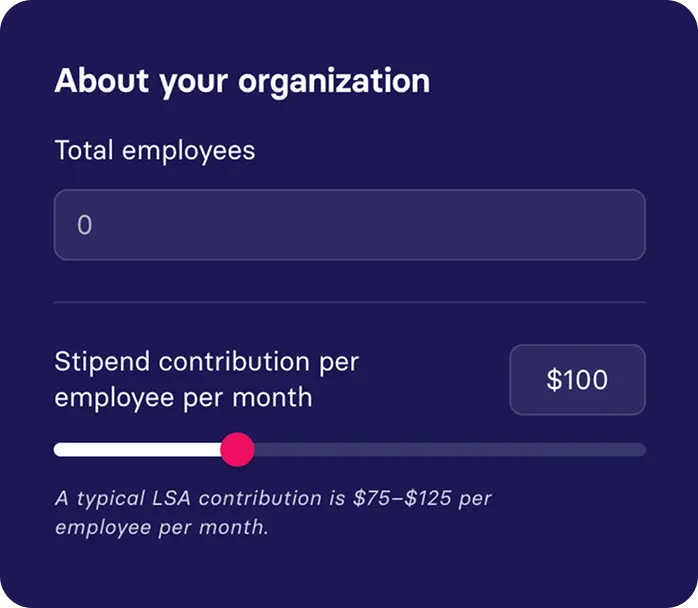In this post
Lorem ipsum dolor sit amet
Lorem ipsum dolor sit amet
Traditional fertility benefits packages focus on the struggle of heterosexual couples to conceive a child. Companies provide vital access to the fertility treatments and emotional support they need to boost their chances of conception.
But what about everyone else who wants to become a parent? Single, gay, or transgender people who want to build their own beautiful families face an entirely different set of obstacles. And unfortunately, most employers have not addressed these unique challenges and needs in their fertility benefits packages.
A family formation benefits package is an inclusive alternative. This guide details what’s included, why companies should offer them, and how employers can keep diversity top of mind when designing these family building benefits packages.
Understanding family forming benefits
Family forming benefits support employees who are starting or expanding their families, whether through birth, adoption, or surrogacy. While fertility benefits traditionally cater to cisgender women who require reproductive technologies like IVF due to an infertility diagnosis, family forming benefits recognize that people make families in numerous ways, not limited to biological conception. They create an inclusive and supportive work environment that accommodates employees pursuing different paths to parenthood. These might include:
- Single parents by choice
- Employees with existing children who haven’t yet completed their families
- LGBTQ+ employees
- Employees requiring a donor or surrogate to start or grow their family
- Foster or adoptive parents
While there’s undoubtedly some overlap between family forming and fertility benefits, they’re not interchangeable terms. For example, fertility benefits might include aspects of reproductive health not related to growing a family, such as vasectomy treatments, which are not part of a family forming plan.
Types of family forming benefits
There are multiple paths to creating your family, each with unique challenges and costs. Family planning benefits can help employees offset some of these expenses and provide additional support. Some common types of family forming benefits include:
Fertility education
Only some people who want to start or grow a family need access to reproductive technologies. Even among those who have previously used IVF to get pregnant, a new UCL study finds that 1 in 5 women will conceive naturally in the future. While there are no guarantees, employers can support their workers by providing access to natural fertility education, including how to time intercourse to coincide with ovulation. Companies can also offer a fertility stipend for employees to spend on basal body thermometers, fertility lubricants, subscriptions to cycle tracking apps, and nutritional education to support employees on a path to natural conception.
Assisted reproductive technologies
Approximately 500,000 babies in the U.S. are conceived each year using assisted reproductive technologies (ART) such as in vitro fertilization (IVF), intracytoplasmic sperm injection (ICSI), intrauterine insemination (IUI), and donor eggs or sperm. These technologies can be expensive, and insurance coverage is often limited or non-existent. Employers can help ease the financial burden for employees by providing coverage for these treatments or offering a fertility health benefits program.
Adoption assistance
Some employees may choose to adopt a child rather than conceive one, but this can be an expensive process for those using an adoption agency or an independent attorney. Typical costs reach $20,000 to $45,000, but unfortunately, companies that offer fertility coverage aren’t as generous with their family forming adoption support. A study by Fertility IQ revealed that only 1 in 5 companies providing fertility benefits also support adoption and fostering. Those that do allocate an average of $8,000 per employee for adoption compared to the average of $36,000 support allocated for fertility.
Donor-assisted reproduction
There are several options your employees can take to achieve a donor-assisted pregnancy, including the following:
Surrogacy
Gestational surrogacy is the process of a woman carrying and delivering another person’s baby, which may be a suitable option for same-sex couples or those who are medically unable to carry a child to term. This process is permitted in all U.S. states except for Michigan, Louisiana, and Nebraska, but it is an expensive family forming option, costing up to $50,000 to $60,000.
Egg donors
12% of IVF cycles rely on donor eggs, according to the CDC. This amounts to around 16,000 cycles annually. Women with healthy and viable eggs can donate them to help others, which is a process that involves hormone injections, monitoring, and then retrieving the eggs for fertilization outside of the body. The costs vary depending on the complexity of retrieval and treatment. However, companies interested in supporting employees with a donor egg cycle should budget around $28,000 per donor cycle.
Sperm donors
Sperm banking is a well-established procedure that can help individuals or couples conceive using assisted reproductive technologies such as IVF or IUI. The New York Times reports the following breakdown of people who rely on sperm banking to conceive:
- 20% are heterosexual couples with male infertility diagnoses
- 60% are gay women
- 20% are single mothers by choice
Unfortunately, the pandemic created a shortage of sperm, as men were unable to donate sperm as frequently. At the same time, the demand increased as people experienced more flexibility in their work and personal lives. Forbes reports the current cost of a vial of sperm is between $400 to $2,000, although there may be additional costs for shipping, storage, and registration fees.
Tip: Curious about how much companies are offering in family formation benefits? The 2024 Benepass Benefits Benchmarking Guide found that companies offer a median of $5,000 in annual caregiving benefits and $20,000 in annual family planning benefits, to be used for a variety of childcare and family formation needs. Download the complete guide to see more trends by company size and industry.

Why offer family forming benefits?
Starting a family sounds like it belongs firmly in the “personal” category. So, how have family forming benefits made their way into the corporate world as a potential game-changer for your company culture? Here are some compelling reasons:
Build awareness of fertility health
Fertility health has long been hushed away as something society doesn’t talk about. However, this silence surrounding fertility has led many employees to feel shocked when they struggle to start or grow a family or learn that their health insurance doesn’t cover any part of the process.
Kathy Abernethy is the Founding Clinician at digital health platform Peppy, and she believes that we need to keep building on conversations and awareness about fertility and reproductive health. She said:
“Maintaining the momentum generated in 2023 will be key for next year when it comes to underserved areas of healthcare. The public discourse on women’s health will continue to grow in scale in 2024, with more dialogue on topics such as fertility health that have been boosted by support from prominent figures across society. We hope to see this momentum take off in men’s health too, which has long been neglected in public health conversations. Employees are becoming more and more conscious of their healthcare benefits, so we expect to see more companies increase their offering in 2024.”
Companies can play their part by normalizing discussions about family forming, providing ongoing support for those who need it, and ensuring everyone understands their available options.
Improve employee retention
Job-hopping employees have numerous reasons to get itchy feet and move to one of your competitors. But if you’re already experiencing high turnover, fertility benefits could help retain some of your top talent.
A global report finds that 72% of women would stay with their current employer longer if they had access to fertility benefits, proving how influential this benefit can be to employees during their family planning journeys.
Attract talented employees
Similarly, family forming benefits can attract some of the best people in your field, significantly impacting your employer brand. You want to be known for more than just having a great product or service; you want to be recognized as a company that cares for its employees and offers inclusive benefits that help everyone can thrive.
A fertility and family forming survey of 5,000 people across the U.S., UK, Canada, India, and Mexico found that 65% of respondents would ask about fertility benefits before accepting a new job offer. If they were unavailable, then 42% would consider this a dealbreaker.
Enhance employee wellbeing and productivity
Any single person or couple struggling to build or grow a family understands how all-consuming it can be. The same fertility and family forming survey revealed that 65% of respondents spend time at work researching treatments, benefits, and other topics associated with family forming. Unfortunately, 55% believe that fertility challenges have negatively impacted their work performance.
Although there are no guarantees that family forming benefits will produce a positive outcome, they can go a long way to alleviating the stress involved in family planning. This is crucial for companies because when employees feel supported in their personal lives, they’re likely to be more focused and productive during working hours.
Family forming benefits and DEIB
A family forming benefits package is more inclusive than a standard fertility plan. It supports all your employees, regardless of gender, sexual orientation, or relationship status in their dreams of becoming parents. Here’s how to ensure your benefits plan ties in with your DEIB initiatives:
Communicate with your employees
Some companies fall into the trap of prescribing benefits that employees don’t want or need. Instead, start by asking your employees how they feel about your current benefits, what more they would like to see, and if they’re aware of the existing benefits. By doing this, you’ll better understand the diverse needs of your workforce and can tailor your plans accordingly.
Lean on employee resource groups
Employee resource groups are invaluable in gaining insight into what your employees need and want, ensuring that solutions don’t overlook certain communities or demographics, and advising on how to best communicate with their peers. If you don’t yet have any ERGs, consider setting them up to support minority groups in your organization, including LGBTQ+ employees, working parents, and people struggling with fertility challenges.
Promote a culture of inclusivity
Offering family forming benefits isn’t enough if your company culture is not inclusive. Ensure that you have appropriate policies in place to avoid discrimination based on gender, sexual orientation, or family planning choices. Create an environment where all employees feel safe and supported, regardless of their personal family goals. This step fosters a diverse and inclusive workplace where all employees feel valued and included.
Liaise with your legal departments
As with any other employee benefit, liaising with your legal departments before implementing a family forming benefits plan is crucial. Legal professionals will ensure the plan is compliant and inclusive, avoiding potential legal issues or discriminatory practices. Work together to create a fair and comprehensive benefits package that supports all employees’ individual family goals.
How to add family forming options to your benefits package
As we make progress in breaking the silence around fertility, companies need to take an active role in supporting their employees’ family forming journeys. By promoting inclusivity, companies will improve employee retention, attract top talent, and enhance employee wellbeing and productivity.
The Benepass Family Care and Formation Account offers a single solution for every type of family need at every stage in their family planning. Here’s how it works:
- You’ll choose your program’s eligible categories, including family planning services, fertility services, or adoption.
- We’ll implement your unique policy by coding it into the Benepass benefits administration platform.
- We’ll connect your Benepass account to payroll, easing auto-enrollment for your team.
- You’ll invite your employees to use their Benepass Family Care and Formation Account from day one.
Ready to take a more inclusive approach to supporting your employees as they become parents? Book a free Benepass demo today, or contact sales@getbenepass.com with any queries.
Read up on other benefits that can complement a family care and formation account and further support employee wellbeing:
- Meal Allowance: What Employers and Employees NEED To Know
- A Guide to Work From Home Stipends (Work Stipends in 2023)
- A Wellness Stipend Guide For Employee-First Companies
- Cell Phone Stipend: A Win-Win Solution for Employers and Employees
- Travel Stipends Guide: What You Need To Know
- Gas Stipends: How They Work and Common Questions
- How to Offer the Best Childcare Benefits for Employees
- Employee Rewards and Recognition Programs: What, Why, and How
- Technology Stipends: What, Why, and How







